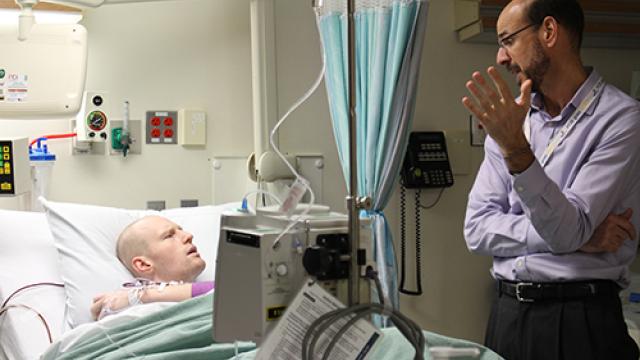
Animated human cells.
Image Credit: Pixabay
Adults with B-cell lymphoma that has come back after treatment or has stopped responding to treatment may be eligible to participate in a clinical trial at the NIH Clinical Center.
B-cell lymphoma is a cancer of certain white blood cells called lymphocytes that are found in lymph nodes and normally help to fight infections. B-cell lymphoma causes the body to make large quantities of abnormal B cells that can’t fight infections well and can spread to other parts of the body, causing pain and abnormal organ function. Aggressive B-cell lymphoma, which usually grows and spreads quickly, is often curable with front-line chemotherapy, but patients who do not respond to chemotherapy or experience disease relapse following chemotherapy are rarely cured with standard therapy. Indolent B-cell lymphoma, which usually grows and spreads very slowly, is generally incurable with standard therapy.
Christopher J. Melani, M.D., Assistant Research Physician in the Lymphoid Malignancies Branch, is leading a study to see whether a combination of six drugs is safe and can help people with both aggressive and indolent B-cell lymphoma. Participants must have B-cell lymphoma that has come back after standard treatment or has stopped responding to that treatment. They must also have had at least one prior therapy for cancer. Three of the six drugs (venetoclax, ibrutinib and lenalidomide) block signals and proteins that cancer cells need to grow and divide. Three of the drugs (prednisone, obinutuzumab and polatuzumab) work in different ways to make cancer cells die or stop growing. Researchers want to learn if these drugs are safe and effective against B-cell lymphoma when given together.
Clinicaltrials.gov identifier: NCT04739813
NCI Protocol ID: NCI-21-C-0014
Official Title: Phase 1 Study of Venetoclax, Ibrutinib, Prednisone, Obinutuzumab, and Revlimid in Combination With Polatuzumab (ViPOR-P) in Relapsed/Refractory B-cell Lymphoma
The Center for Cancer Research is NCI’s internal cancer center, a publicly funded organization working to improve the lives of cancer patients by solving important, challenging and neglected problems in cancer research and patient care. Highly trained physician-scientists develop and carry out clinical trials to create the medicines of tomorrow treating patients at the world’s largest dedicated research hospital on the campus of the National Institutes of Health in Bethesda, Maryland.
For more information on CCR clinical trials click here, and subscribe to have the latest CCR clinical trials sent directly to your inbox.


